Omega-3: A Natural Solution to Canine Joint Pain
Help Your Dog Move With Ease Again

Help Your Dog Move With Ease Again
As dogs age, many pet owners notice that their beloved companions begin to slow down. The playful energy that once defined them fades, and movements like climbing stairs or chasing a ball can become painful. Joint pain, especially in older dogs, is a common issue that affects their overall quality of life. Fortunately, there’s a natural remedy that has proven to help:
These essential fatty acids are known for various health benefits, especially in reducing inflammation. For dogs struggling with joint pain, adding this natural supplement to their diet could make a significant difference.
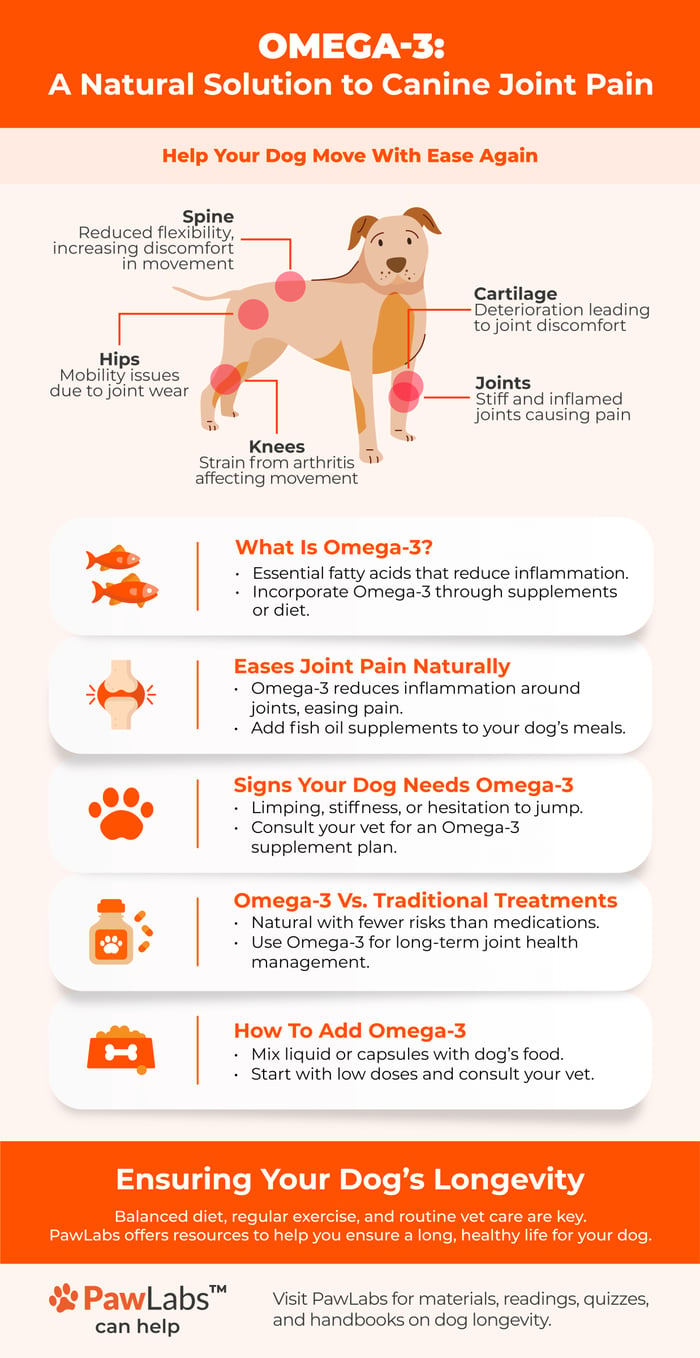
What Is Omega-3 And How Does It Benefit Dogs?
Polyunsaturated fatty acids, such as omega-3, play a crucial role in many biological processes. These fatty acids are considered "essential" because the body cannot produce them on its own. Dogs, like humans, need to get these from their diet or supplements. Common sources include fish oil, flaxseed, and certain types of algae.
For dogs, these fatty acids can promote heart health, reduce inflammation, and support cognitive function. They’re especially beneficial for older dogs or those with chronic conditions like arthritis. By reducing inflammation, they can help relieve joint pain, allowing your dog to move more easily.
How Does It Help Alleviate Joint Pain In Dogs?
When dogs experience joint pain, it is often due to inflammation from arthritis or other joint-related conditions. Fatty acids, particularly EPA (eicosapentaenoic acid) and DHA (docosahexaenoic acid) possess anti-inflammatory properties that can help ease these symptoms. By reducing inflammation, they can lessen pain and swelling in a dog’s joints.
A study in the Journal of the American Veterinary Medical Association demonstrated that dogs with osteoarthritis who were given fish oil supplements showed improved mobility and reduced pain. Omega-3 helps by supporting cartilage health and joint lubrication, making movement less painful for your dog.
What Are The Signs That Your Dog Might Need Omega-3 Supplements?
If your dog is limping, struggling to get up, or showing less interest in physical activities, joint pain might be the cause. Other signs to watch for include stiffness after resting, reluctance to jump or climb stairs, or noticeable changes in movement. These could indicate joint discomfort, which may benefit from omega-3 supplementation.
Additionally, behavioral changes such as irritability, withdrawing from play, or whining when touched near their joints may also suggest discomfort. If these symptoms sound familiar, it might be time to consult your veterinarian about adding a supplement.
How Does It Compare To Other Treatments For Canine Joint Pain?

There are several treatments available for dogs with joint pain, including pain relievers like NSAIDs (non-steroidal anti-inflammatory drugs) and steroids. While these medications can offer temporary relief, they come with potential side effects such as gastrointestinal issues or long-term liver damage.
It provides a natural alternative with fewer risks. It can be used alongside traditional treatments or as a standalone supplement. Dr. Katy Nelson, a veterinarian at Belle Haven Animal Medical Centre, Virginia, says: "Omega-3s offer a safe and effective way to reduce inflammation without the side effects that come with long-term NSAID use." (NBC News). This makes it an appealing option for managing joint pain in dogs naturally.
What Types Are Best For Dogs, And Where Do They Come From?
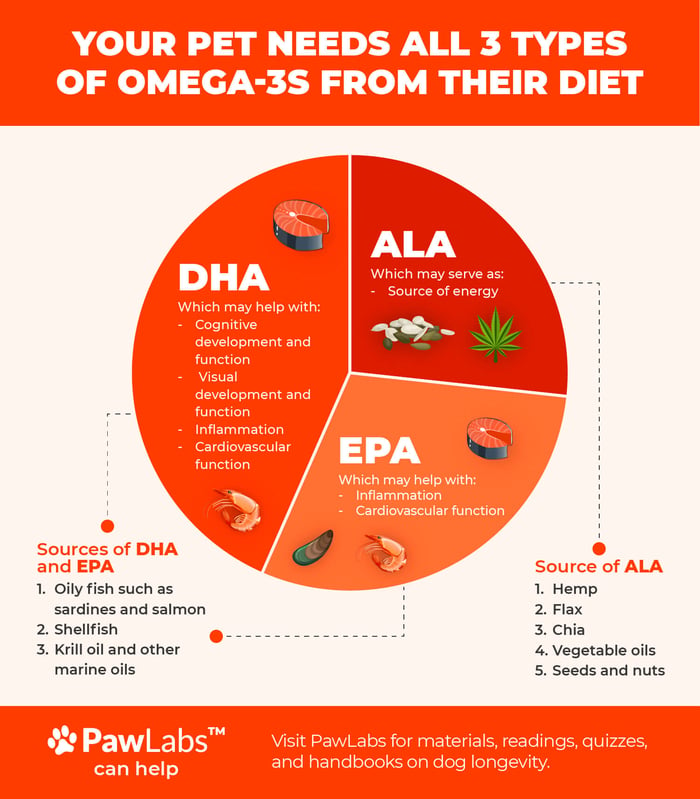
When choosing a supplement for your dog, it’s important to understand the different sources. Fish oil, especially from salmon or sardines, is the most common and effective option. It contains high levels of EPA and DHA, which are the fatty acids responsible for reducing inflammation and supporting joint health.
Plant-based sources, like flaxseed, contain ALA (alpha-linolenic acid), which must be converted into EPA and DHA in the body. However, dogs aren’t very efficient at this conversion, making fish oil a more reliable source. Some supplements also use krill oil, which is another excellent choice due to its high bioavailability and antioxidant content.
How Should It Be Incorporated Into Your Dog’s Diet Or Supplementation?
Introducing these fatty acids into your dog’s diet is easy, often through fish oil capsules or liquid. Many high-quality dog foods also contain Omega-3, but it’s essential to ensure the amounts are sufficient for therapeutic effects. If you’re unsure, consult your veterinarian to determine the appropriate dosage for your dog’s weight and health needs.
It’s best to give these supplements with food, especially meals containing some fat for better absorption. Be careful not to over-supplement, as too much can cause digestive issues or blood thinning. Starting with a low dose and gradually increasing it can help your dog adjust to the supplement without side effects.
Are There Any Side Effects Or Risks Of Giving Supplements To Dogs?
While it is generally safe for dogs, there are some side effects to watch out for, especially if given in excessive amounts. These can include diarrhea or upset stomach. Additionally, because it can thin the blood, it may increase the risk of bleeding, particularly in dogs with clotting disorders.
It’s always wise to check with your vet before adding any supplement to your dog’s diet, especially if they are already on medication. Your vet can recommend the right dosage and monitor your dog for any adverse reactions, ensuring they receive all the benefits without complications.
Why Is It An Essential Ingredient In Joint Pain Supplements For Dogs?
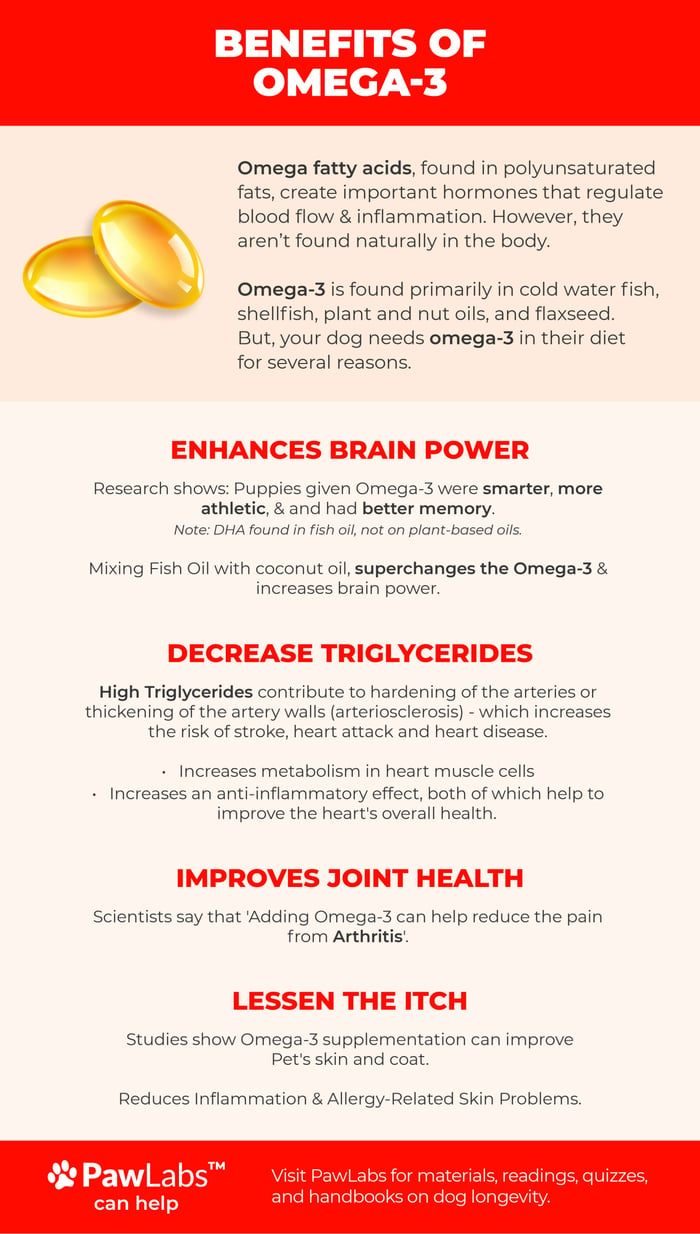
This fatty acid plays a crucial role in managing joint pain for dogs. Its ability to reduce inflammation and support joint lubrication makes it an essential ingredient in supplements designed to promote joint health. For dogs suffering from arthritis or other joint issues, it can provide a natural and effective way to alleviate discomfort and improve mobility.
What makes it especially beneficial is that it not only helps relieve pain but also supports overall joint function and tissue health. This combination of benefits makes it a key component in supplements aimed at long-term joint care for dogs of all ages.
The Importance of Dog Longevity
Helping your dog live a longer, healthier life means more years of joy and companionship. Joint pain can affect both your dog’s quality of life and lifespan, making it essential to address these issues early. By using natural supplements like Omega-3, you can contribute to your dog’s longevity and keep them active and happy for longer.
Wild Alaskan Salmon Oil
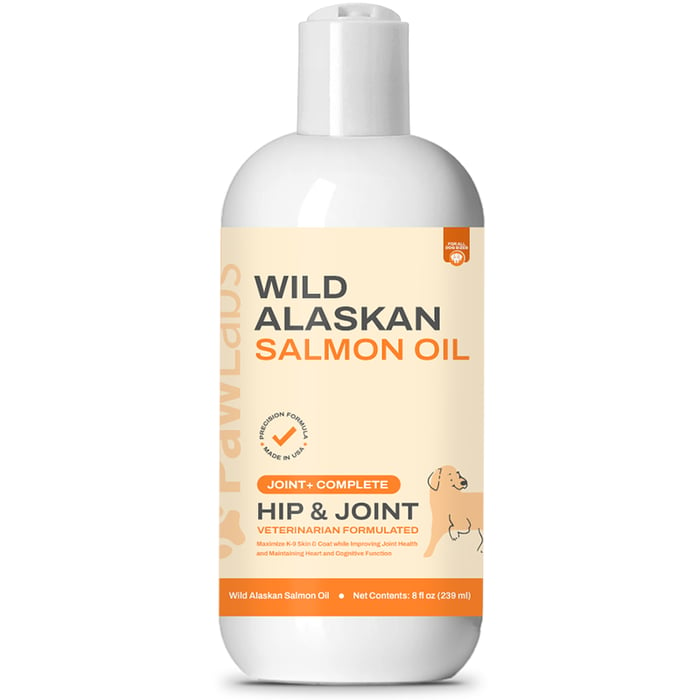
Wild Alaskan Salmon Oil stands out for its purity, high omega-3 and omega-6 content, and sustainable sourcing. Unlike farmed salmon, wild Alaskan salmon offer higher nutritional value and are free from contaminants and artificial additives. This ensures superior quality and health benefits for your dog.
Wild Alaskan Salmon Oil
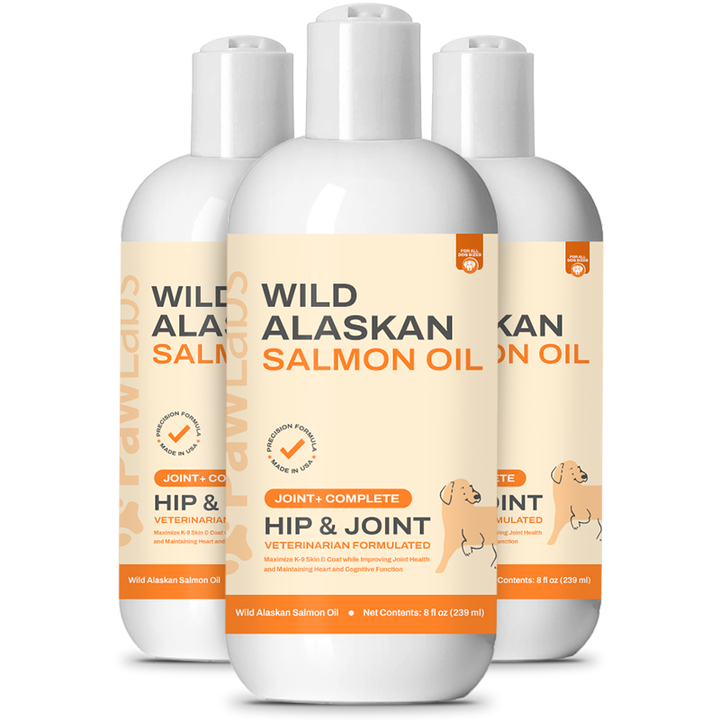
$24.95
$34.95
8 ESSENTIAL KEY NUTRIENTS: Omega-3 (EPA and DHA) Omega-6 Natural Vitamin D3 Essential B Vitamins Astaxanthin Biotin Selenium Iodine … read more
 SUCCESS!
SUCCESS!





